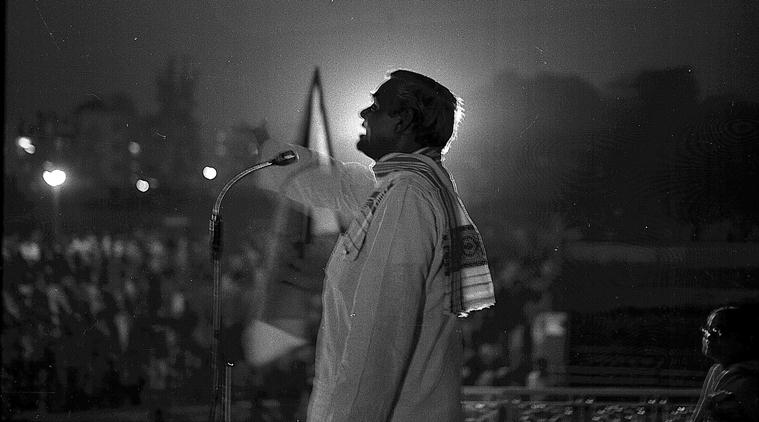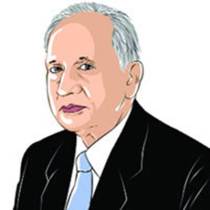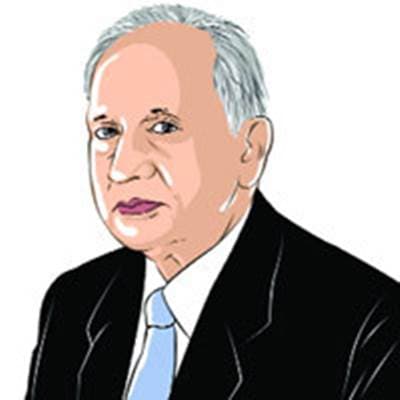Prime Minister who was a poet
Atal Bihari Vajpayee’s poems are a part of his legacy that must not be ignored.

Atal Bihari Vajpayee
An Urdu couplet of Firaq Gorakhpuri reads as Sham bhi thi dhuwan dhuwan husn bhi tha udas udas, dil ko kaee kahanian yaad si aake rah gaeen (A smoke-filled evening, a melancholy beauty, and a heart full of half-remembered stories). This was my state of mind as I watched on TV the mortal remains of the late Atal Bihari Vajpayee being consigned to the flames. As dignitaries kept placing flowers at his feet amid military rituals, I kept recollecting Thomas Gray’s line on the reality of life — ”all paths of glory lead but to the grave”.
I had known Vajpayee since settling in Delhi in early 1970s. On numerous occasions, I heard his mighty political speeches and captivating poetic recitations. During 1977-79, I watched him in action in the role of foreign minister in Morarji Desai’s coalition government. On the eve of demolition of the Ayodhya mosque in December 1992, I heard him forcefully defending the planned kar seva on the disputed site since, according to him, it was being performed “to honour a Supreme Court decision”. I was abroad on sabbatical when Vajpayee wound up his first 13-day government in May 1996 and had watched in the foreign media his declamatory speech in Parliament.
Six months later, the Deve Gowda government put me in the Chair of the National Minorities Commission. By the time Vajpayee returned to power in March 1998, I had entered the second year of my three-year tenure and spent the remainder under his government. Growing anti-minority incidents in the country and my solemn official responsibilities in that regard gave me a chance to frequently meet him and gauge him from close quarters. As prime minister, he did indeed charm all and sundry. But we developed a special bonhomie due to our common interest in poetry.
“Vajpayee and Mahmood have one attribute in common: both are part-time poets”, wrote the India Today magazine in its issue on February 15, 1999, adding “but these days it is the differences that seem more apparent”. There were in fact “no differences” — keeping the head of government informed of the issues the Minorities Commission had to handle was my obligation and he was, in fact, more receptive than his two predecessors. Knowing of his poetic instinct, I often used poetry — his and mine — to convey my feelings on crucial issues. Once he patiently listened to my couplet — composed in the context of Ayodhya dispute — Ram hai Bharat ki azmat ka nishan, uski hurmat ko daghila mat karo (Ram is symbol of India’s greatness, do not stain his sanctitutde), and on another occasion quietly heard me reminding him of his poem “Ham jang na hone denge”(we will not let there be a war), written to promote friendly Indo-Pak relations.
A slim anthology of Vajpayye’s poetry titled Meri Ikyawan Kavitayen (My 51 Poems) was published in 1995, launched by Congress Prime Minister P V Narasimha Rao. In his preface to the book, describing poetic talent as his virasat (legacy), Vajpayee admitted “rajneeti ne meri kavya-rasdhara ko avaruddh kiya” (politics arrested the flow of my poetic propensity) and added “kavita aur rajneeti sath nahin chal sakti” (poetry and politics cannot go together). He had thus attained political glory at the cost of a foreseeable poetic pinnacle. Yet, the poetry he left for posterity is superb. Full of popular Urdu expressions, the poems in the anthology are impassioned and awesome, overflowing with national pride or religious fervour. Pandrah Agast ka din kahta aazadi abhi adhuri hai (August 15 is a day that says freedom is yet incomplete) is as enthusiastic as Hindu tan-man, Hindu jiwan, rag rag Hindu mera parichay (Hindu body and soul, a Hindu life in every vein Hindu is my introduction).
In a soul-stirring poem titled Satta (political authority), referring to those indulging in the killing of innocents, he laments “Kya marne walon ke sath unka koi rishta na tha/ na sahi dharm ka nata kya dharti ka bhi sambandh na tha/ dharti maan aur ham uske putr Atharvaved ka ye mantra kya sirf japne ke liye, hai jeene ke liye nahini (did they have no relation with the dead/ may be not of kinship, or faith but was their not even the bond of soil/ The earth is mother and we her children, is this precept of Atharvaved just for counting one’s beads, not for living by).
Is anybody listening?
The writer is a former Chair of the National Minorities Commission and member, Law Commission of India
For all the latest Opinion News, download Indian Express App
More From Tahir Mahmood
- Commissions Of InactionNational commissions are white elephants: Expensive and ineffective. ..
- A Legend In His LifetimeTill the end, Justice Rajinder Sachar spoke up for the rights of fellow citizens..
- An untenable defenceIn both religion and law, polygamy has no place. ..








































No hay comentarios:
Publicar un comentario